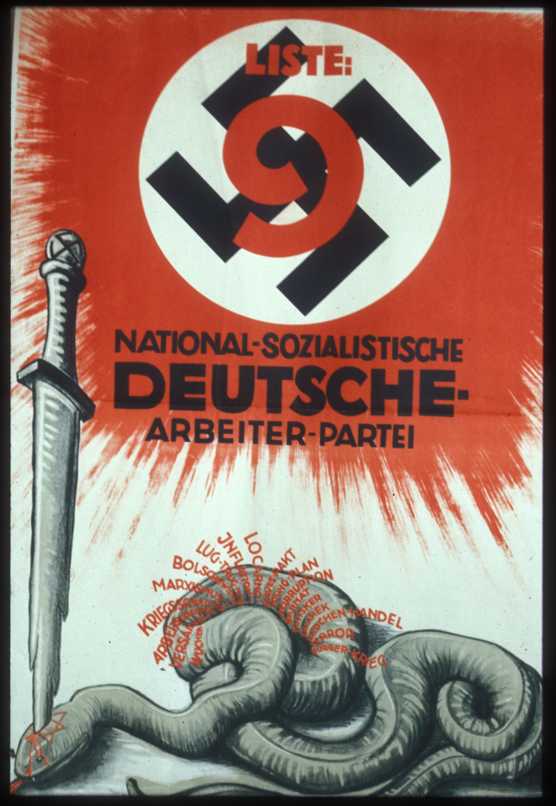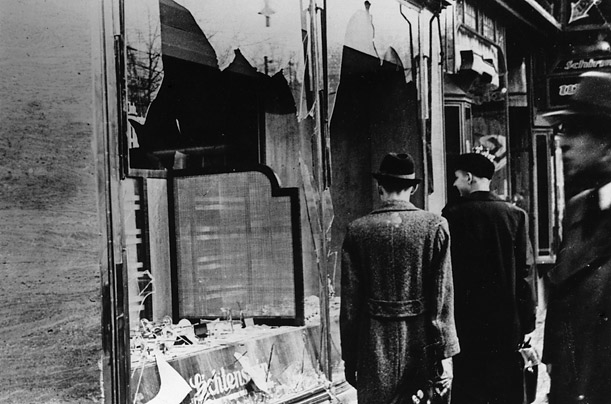Adolf Hitler, the leader of the Nazi Party, argued that the Germans was superior to all other races. Hitler became obsessed with 'racial purity' and used the word 'Aryan' to describe his idea of a 'pure German race' or Herrenvolk. The 'Aryan race' had a duty to control the world.
The Nazis believed that the Aryans had the most "pure blood" of all the people on earth. The ideal Aryan had pale skin, blond hair and blue eyes.
Non-Aryans came to be seen as impure and even evil. Hitler believed that Aryan superiority was being threatened particularly by the Jews. Therefore, a hierarchy of 'races' was created with the Aryans at the top and with Jews, Gypsies and black people at the bottom. These 'inferior' people were seen as a threat to the purity and strength of the German nation.
The term Aryan originally meant something completely different. Its origin started in the Vedic period by Indo-Iranian people in India. The word was a self-designation and ethnic label that referred to the noble class from the Āryāvarta parts of India. The Nazis, however, linked the word 'Aryan' with the German word 'Ehre', which means 'honour' and therefore, used 'Aryan' to depict their image of 'the honourable people'.
This vivid poster from the September 1930 Reichstag election summarizes Nazi ideology in a single image. A Nazi sword kills a snake, the blade passing through a red Star of David. The red words coming from the snake are: usury, Versailles, unemployment, war guilt lie, Marxism, Bolshevism, lies and betrayal, inflation, Locarno, Dawes Pact, Young Plan, corruption, Barmat, Kutistker, Sklarek [the last three Jews involved in major financial scandals], prostitution, terror, civil war. Source: www.calvin.edu
 This vivid poster from the September 1930 Reichstag election summarizes Nazi ideology in a single image. A Nazi sword kills a snake, the blade passing through a red Star of David. The red words coming from the snake are: usury, Versailles, unemployment, war guilt lie, Marxism, Bolshevism, lies and betrayal, inflation, Locarno, Dawes Pact, Young Plan, corruption, Barmat, Kutistker, Sklarek [the last three Jews involved in major financial scandals], prostitution, terror, civil war. Source: www.calvin.edu
This vivid poster from the September 1930 Reichstag election summarizes Nazi ideology in a single image. A Nazi sword kills a snake, the blade passing through a red Star of David. The red words coming from the snake are: usury, Versailles, unemployment, war guilt lie, Marxism, Bolshevism, lies and betrayal, inflation, Locarno, Dawes Pact, Young Plan, corruption, Barmat, Kutistker, Sklarek [the last three Jews involved in major financial scandals], prostitution, terror, civil war. Source: www.calvin.eduThe use of propaganda
The Nazi totalitarian government had total control over men, women, youth, newspapers, radio, art, books, music, universities, schools, police, army, law courts and religion. In other words, they controlled every aspect of life in Germany. Furthermore, Joseph Goebbels, one of Hitler's most devoted associates, was elected as the Reich Minister of Propoganda from 1933 - 1945.
To control every part of every German's life, the Nazi Party had to persuade people to believe that Hitler had the answers to all their problems. The Nazi Party used terror, on the one hand, and propaganda on the other.
The Nazi Party used propaganda to influence the German people's thoughts and opinions. Propoganda was used to bring most Germans together for the common goal - to stand together against the enemies of the Nazi Party.
The propoganda unit also set their sights on the youth of Germany. For example; schools, universities and churches were indoctrinated with Nazi teachings. Furthermore, the importance of the role of women in the indoctrination of children was recognised and women were encouraged to have more children. In 1933 Hitler set up the "Hitler Youth" or "Hitlerjugend", an organisation aiming to train and educate the male youth with Nazi principles and ideologies. Young boys were trained and prepared to use weapons - clearly preparing for what was to come.
What is progaganda?
- Propaganda is persuasive communication which influences beliefs, opinions and emotions.
- Propaganda may be true or false, but it is always deliberately used to influence people.
- Propaganda does not stand up to criticism.
- Propaganda appeals to the heart or emotions, not to the mind or reason.
Propaganda in our world today
Propaganda was not just something that Hitler used. It is widely used in our society today.
Mass communication makes propaganda more sophisticated. Propoganda is used on television, radio and in popular magazines, as well as by methodology of politicians.
In this context, it is important to learn that one must think critically from an educated basis. Ideally, in a democratic society we should all have the opportunity to from our own opinions and be able to respect others' opinions as it could be seen as a learning opportunity.
Examples, in an American context, of how Language could be used as form of Propoganda as it changes the impact of information received:
- The War Department was changed to The Department of Defense in the 1940s
- In the 1980s, the MX-Missile was renamed "The Peacekeeper"
- During wartime, civilian casualties are called 'collateral damage' and murder is called 'liquidation'
- Traumatised soldiers were called 'shell shocked'. This has been changed to 'combat fatigue' and then to 'post traumatic stress disorder' - a phrase that has nothing to do with the harsh reality of war at all.
What is anti-Semitism?
Anti-Semitism is the hatred of Jews. Although many people believe that Anti-Semitism originated in Nazi-Germany, hatred of Jewish Communities existed well before the 1930's. Jews were often used as a scapegoat when things went wrong - they were blamed for no reason.
The Nazis said that Jews were inferior and undesirable. Propaganda was used in schools and at rallies, on the radio, in posters, films and newspapers to increase Anti-Semitism and make people believe that 'The Jews are our misfortune.'
The Nazis stereotyped Jews. That means that they created a simplistic, false impression of Jews. Hitler gave the following instructions to Goebbels, his Propaganda Minister:
"...bring up the Jewish question again and again and again, unceasingly. Every emotional aversion, however slight, must be exploited ruthlessly”¦the emotional aversion to Jews is to be heightened by all possible means". - Adolf Hitler
Every issue of the weekly newspaper, Der StÁ¼rmer repeated on its front page in large letters the slogans:
“THE JEWS ARE OUR MISFORTUNE”
“HE WHO KNOWS THE JEW KNOWS THE DEVIL”
In additon the newspapers favourite was ‘race defilement’. Look at this quote from the newspaper:
"Moreover the Jew has in his veins a large element of Negro blood; his frizzy hair, his wolf lips, the colour of his eyeballs proves this as effectually as the insatiable sexual greed which hesitates at no crime and finds its supremest triumph in the brutal defilement of women of another race. This bestial lust obsesses even a barely mature Jew boy”¦" - Der StÁ¼rmer, August 1945
 'The Night of Broken Glass'. On November 8, 1938, Nazis and others smashed windows and ransacked thousands of Jewish shops in numerous German cities and villages. The coordinated attacks were the first large-scale, openly anti-Semitic act of the Third Reich. Source: www.time.com
'The Night of Broken Glass'. On November 8, 1938, Nazis and others smashed windows and ransacked thousands of Jewish shops in numerous German cities and villages. The coordinated attacks were the first large-scale, openly anti-Semitic act of the Third Reich. Source: www.time.com Children's books and school books were used to influence children against the Jews. It is easier to get the message across to younger children than to adults. For example, in one book, a Jew was depicted as a 'poison mushroom'. Children know that poison mushrooms are harmful, and they associated poison mushrooms with Jewish people.
The Nazis required Jews to wear a yellow Star of David made of fabric and stitched to their clothing.
Creating 'Aryans'
One of the Nazi aims was the creation of a Master Race. This meant encouraging people with "pure blood" (in other words, those with blond hair and blue eyes) to have more children. In 1935 the leader of the Schutzstaffeln (SS), Heinrich Himmler, created a project called the Lebensborn, which means 'spring of life'. The aim of the project was to give young 'racially pure' girls the opportunity to give birth in secret. Such 'pure' girls could come to these Lebensborn centres to create a baby with one of the SS officers. They could also have the baby at the Lebensborn centre. The children would then be taken away from their mothers and given to the SS, who took charge of their education and upbringing. Many of these children grew up never knowing their biological parents.
The Lebensborn policy went even further during World War II. In the countries that Germany occupied, the SS would kidnap children who had blonde hair and blue eyes, and take them to the Lebensborn centres. There, they were forced to reject their background and to accept the Nazi teachings. Some were told that their parents had abandoned them. In the end, most of them were however taken to German concentration or death camps, where they were killed. Others were adopted by SS families. This process was known as Germanisation.
For more about the Lebensborn policy, go to www.jewishgen.org
For information on women and family life in Nazi Germany go to: www.schoolhistory.co.uk